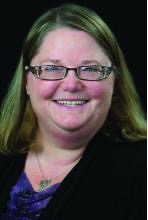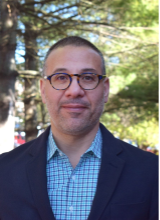Wednesday, March 8, 2023
Abstract
NIFA National Program Leaders from the Institute of Food Production and Sustainability and the Institute of Youth, Family, and Community will discuss USDA and NIFA priorities and programs supporting food and agricultural defense and resiliency and provide information on NIFA competitive opportunities in these areas (including examples of successfully funded projects).

Dr. Michelle Colby
Dr. Michelle Colby serves as the National Program Leader for Animal Biosecurity in the Division of Animal Systems at the National Institute of Food and Agriculture (NIFA). She provides national program leadership, implementation, management, engagement, and administration for veterinary and animal biosecurity programs. She has previously served in a variety of positions coordinating policy and research and development and the nexus of agriculture and homeland security including USDA’s Office of Homeland Security, DHS’s Science and Technology Directorate, and the White House Office of Science and Technology Policy, where she began her career as an AAAS Science and Technology Policy Fellow.
Dr. Colby completed a post-doctoral research fellowship at the Maryland campus of the Virginia-Maryland Regional College of Veterinary Medicine (VRMCVM), as well as a M.S. in Epidemiology and three-year applied veterinary epidemiology residency program. Dr. Colby’s research focused on the use of Geographic Information System databases in the management of infectious diseases of livestock and poultry. Dr. Colby received her Doctor of Veterinary Medicine from VRMCVM and a B.S. degree in Animal Science from the University of Maryland, Eastern Shore.
Dr. Amer Fayad

Dr. Amer Fayad is a National Program Leader in the Division of Plant Systems Protection at the National Institute of Food and Agriculture (NIFA) USDA where he leads programs on Agricultural Biosecurity and Plant Biotic Interactions. He is a plant pathologist specialized in plant virology and integrated pest management (IPM). His research experience has focused on the identification, epidemiology, biological and molecular diversity of viruses, virus movement, interactions between viruses and plant virus resistance genes, and IPM of virus diseases.
Prior to joining NIFA, Dr. Fayad served as the Director of the Western IPM Center, University of California Agriculture and Natural Resources in Davis, California. His experience in managing federally funded IPM programs also includes his work at Virginia Tech as Associate Director of the Feed the Future Innovation Lab for Integrated Pest Management, a program funded by the United States Agency for International Development (USAID). He led IPM project design and implementation, provided research guidance to project partners, coordinated IPM activities relevant to plant pathogens, coordinated identification and development of management strategies including biological control of pathogens, and organized regional and international workshops and symposia. In-country project experience includes
Bangladesh, Cambodia, Ecuador, Ethiopia, Ghana, Guatemala, Indonesia, India, Kenya, Nepal, Senegal, Tanzania, and the United States.
Dr. Fayad has a Ph.D. in Plant Pathology from Virginia Tech, an M.S. in Crop Protection, a B.S. in Agriculture, and a Diploma of “Ingenieur Agricole” from the American University of Beirut.

Dr. Ashley Mueller
Dr. Ashley Mueller is a National Program Leader in the Division of Family and Consumer Sciences within the Institute of Youth, Family, and Community at USDA NIFA. She provides leadership to the Extension Disaster Education Network (EDEN); Smith-Lever Special Needs Competitive Grant; and Smith-Lever (b) and (c) and Special Needs Capacity (1862 land-grant Extension) programs. Dr. Mueller also co-leads the AFRI program Rapid Response to Extreme Weather Across Food and Agricultural Systems (A1712).
Before joining NIFA, Dr. Mueller was a statewide Extension educator and disaster education coordinator for Nebraska Extension. In that role she built capacity in the organization, and she collaborated with county- and campus-based faculty and staff along with state, regional, and federal partners to support Nebraskans in preparing for, responding to, and recovering from extreme weather events, disasters, and other incidents. Dr. Mueller’s previous experiences include outreach communications, distance education academic program management, and program development. She earned a PhD in Agricultural Education with a concentration in Postsecondary Leadership and Administration from the University of Missouri-Columbia, an MS in Agricultural Education from Purdue University, and a BS in Food Science and Technology from the University of Nebraska-Lincoln.
